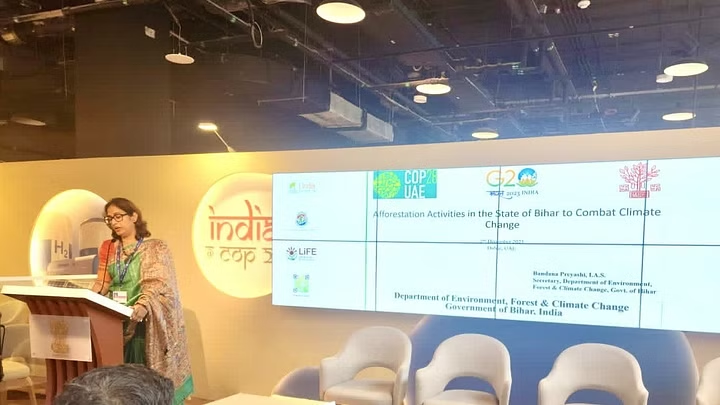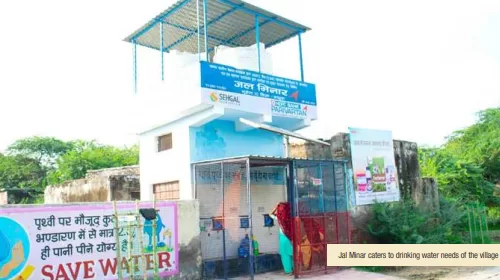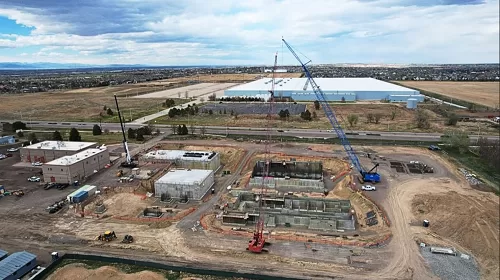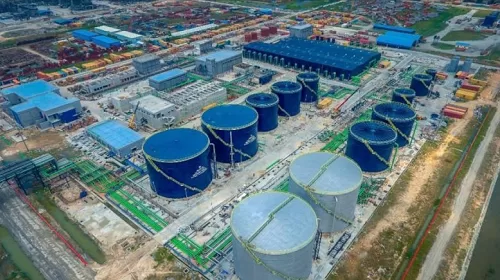The actions undertaken by the Bihar government in the field of afforestation, particularly through the Jal-Jeevan-Hariyali Abhiyan (Rural Development Department), received praise on Saturday from the international community at the ongoing United Nations Climate Change Conference of the Parties (COP-28) in Dubai.
The Bihar delegation, led by Department Of Environment, Forest and Climate Change (DoEFCC) Secretary Bandana Preyashi, Director (Ecology) Surendra Singh, and Principal Chief Conservator of Forest Ashutosh, participated in the prestigious COP-28 event, which gathers nations as signatories to the United Nations Framework Convention on Climate Change (UNFCCC). COP-28 commenced on November 30, marking its opening with an agreement on a loss and damage fund to assist developing countries in coping with the impact of climate change.
During a dedicated “Building Climate Resilience” session at the Indian Pavilion, Ms Preyashi and Mr Singh delivered a detailed presentation titled “Afforestation Activities in Bihar to Combat Climate Change.”
Ms Preyashi provided opening remarks, highlighting the larger policy framework and inter-departmental coordination under Jal-Jeevan-Hariyali Abhiyan. She emphasised Bihar’s holistic approach, stating, “The ‘Jal-Jeevan Hariyali Abhiyan’ initiated in 2019 reflects the inherent interconnectedness between water management, vegetation coverage, and the existence of life. With an 11-pronged strategy involving 15 government departments, the programme showcases a promising way to mitigate the adverse impacts of climate change.”
She further said, “The programme has resulted in the creation and restoration of over one and a half lakh water bodies in a span of four years.”
Discussing the positive outcomes, Ms Preyashi stated, “The green cover in the State has increased from 9.9% in 2019 to 14.75% in 2021, with a total of 381.008 million plantations since 2012-13.”
She also asserted that the experience of Jal-Jeevan-Hariyali Abhiyan could be replicated in regions vulnerable to climate change, such as South Asian countries and Sub-Saharan Africa, facing irregular floods and droughts, respectively.
Furthermore, Ms Preyashi highlighted the implementation of the green budget in Bihar since the fiscal year 2020-21. “Bihar is among the first States in the country to introduce a green budget, aiming to allocate budgetary provisions to address climate change, conserve the ecosystem, and protect biodiversity,” she said.
Mr Singh further delved into the efforts of DoEFCC, elaborating on its initiatives, ongoing programmes, achieved results, challenges faced, and the envisioned way forward.
Other States participating in the session included Sikkim and Jharkhand, and the session was moderated by Ramesh Kumar Pandey, Inspector General of Forests, Ministry of Environment, Forests and Climate Change, Government of India.
The Bihar delegation’s participation at COP-28 underscores the State’s commitment to sustainable practices and its pivotal role in addressing climate change challenges. The global community recognised and appreciated Bihar’s holistic approach, offering hope and inspiration for other regions grappling with the impacts of climate change.
Experts claim that Bihar has undertaken several pioneering measures for climate change resilience.
“Ahead of almost all major states in the country and many parts of the world, the Bihar government decided to work towards long-term low carbon development and build climate resilience for its people and its system. Accordingly, a Memorandum of Understanding (MoU) was signed between the Bihar State Pollution Control Board (BSPCB) and the United Nations Environment Programme (UNEP) in February 2021 to develop climate-resilient and low-carbon development pathways for the state,” Piyush Tripathi, Manager – Communication, Climate, World Resources Institute (WRI) India told The Hindu.
He further said, “Over the last two years, a technical consortium of internationally renowned organisations, including WRI India, has extensively collected data from more than 20 line departments, visited all 38 districts of the State to gain on-ground immersive experience, organised over 350 meetings, and conducted over 30 stakeholder consultations to develop the long-term climate strategy for the State.”




